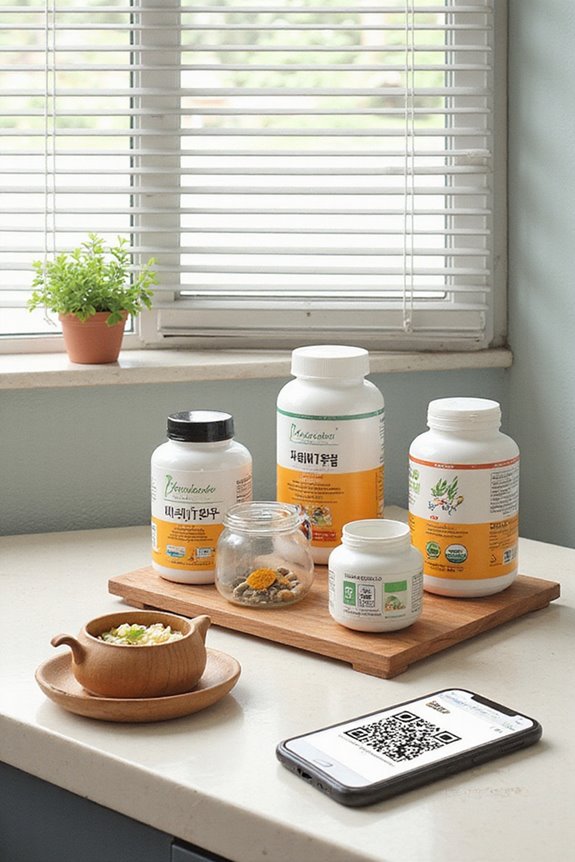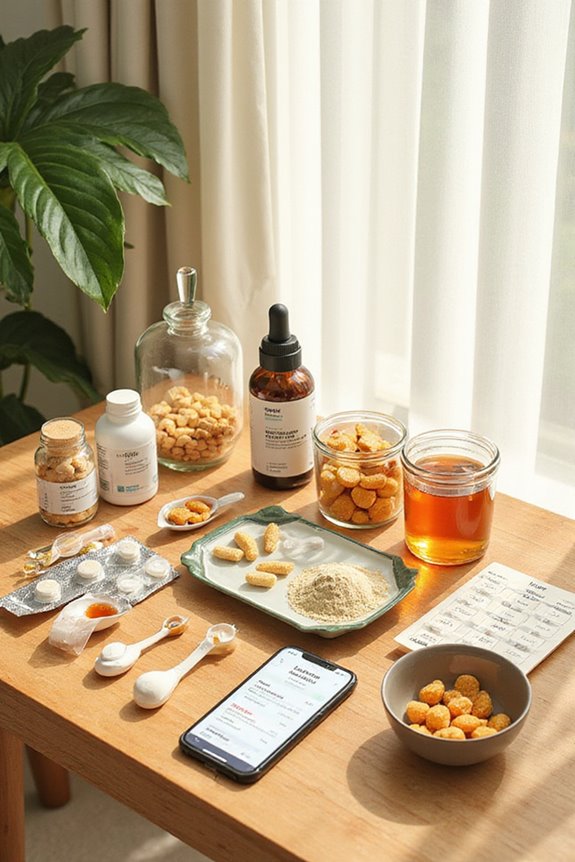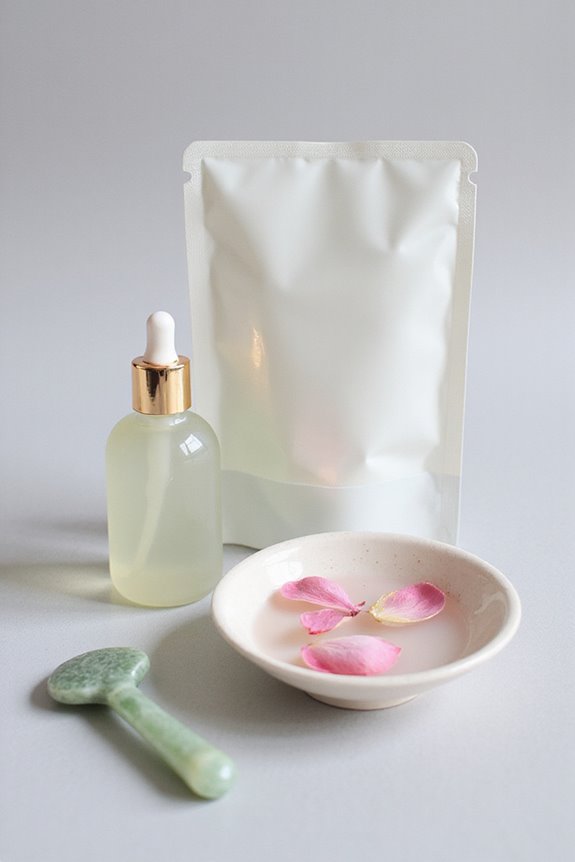When we choose Korean health supplements, we should first understand our health needs, considering factors like our dietary habits and family medical history. Next, it’s essential to check for certifications and regulatory approvals, ensuring the supplements meet safety standards. We should focus on ingredient quality, preferring products with clear sourcing and clinical evidence. Finally, evaluating brand transparency and reputation can enhance our confidence in the chosen supplements. Discovering further details can guide us to make informed selections.
Key Takeaways
- Assess your health needs by analyzing personal health history and lifestyle to determine specific supplement requirements.
- Verify that supplements meet MFDS standards for safety and efficacy, ensuring they are well-regulated.
- Prioritize high-quality ingredients, looking for purity tests and reputable sourcing, like older red ginseng.
- Choose brands with transparent labeling, positive customer reviews, and a history of compliance in their practices.
- Select products with strong scientific backing, confirmed through clinical trials and peer-reviewed research relevant to populations like yours.
Understand Your Health Needs
How do we determine our specific health needs when considering Korean health supplements? First, we must analyze our health history, identifying any familial conditions, such as hypertension or osteoporosis, which could necessitate targeted supplementation. Additionally, we should reflect on our lifestyle habits, including dietary patterns and physical activity levels. For example, individuals with limited sun exposure may require vitamin D supplements, while those focusing on immunity might consider vitamin C or probiotics. Understanding these factors not only helps us select supplements that fill dietary gaps but also aligns with our health goals. Ultimately, by evaluating our unique health profiles, we ascertain that our supplement choices effectively support our overall wellness strategy.
Check for Certifications and Regulatory Approvals

After identifying our health needs and goals, it’s important to verify that any Korean health supplements we consider meet strict regulatory standards. In South Korea, the Ministry of Food and Drug Safety (MFDS) oversees the certification process, confirming products comply with safety and efficacy guidelines. Health Functional Foods must undergo rigorous scientific evaluation and obtain MFDS approval before they can be marketed. This process emphasizes regulatory compliance, focusing on ingredient integrity, labeling accuracy, and manufacturing standards. To guarantee that we select reliable products, we should look for certifications from the MFDS and consider whether the supplements have passed stringent assessments. By doing so, we enhance our confidence in the quality and safety of the supplements we choose.
Focus on Ingredient Quality

When we consider purchasing Korean health supplements, it is crucial to prioritize ingredient quality, as this factor notably influences both efficacy and safety. First, we should look at ingredient sourcing, ensuring components like red ginseng come from credible origins known for their high purity levels. Ingredients from four-year or older ginseng, for example, signify quality. Additionally, rigorous purity testing is critical; supplements must undergo checks to exclude contaminants like heavy metals and pesticides. By choosing products validated through third-party or in-house testing, we reduce the risk of adverse effects considerably. Consistent batch testing verifies that the active ingredients maintain therapeutic concentrations, underscoring that high-quality supplements are both effective and safe for our health needs.
Prioritize Transparency and Brand Reputation

Ingredient quality remains a top priority for us, but the importance of transparency and brand reputation cannot be overlooked. We should guarantee that the brands we consider prioritize clear labeling and provide accurate ingredient information. Regulatory compliance in South Korea means health supplements must demonstrate scientifically supported health claims, affording us, as consumers, a layer of trust. Brands that maintain a good reputation often have a history of compliance and transparent practices, fostering brand trust among consumers. Additionally, consumer education is essential; understanding product labels and manufacturer claims allows us to make informed choices. As we navigate the market, observing customer reviews and third-party certifications can greatly enhance our ability to choose trustworthy, effective Korean health supplements.
Consider Dosage Forms and Convenience

Choosing the right dosage form for Korean health supplements can considerably impact both convenience and adherence to daily routines. Common dosage forms include pills, tablets, and capsules, which provide portability and ease of use, aligning well with user preferences for quick consumption. Liquids offer faster absorption but may have storage challenges, while powdered forms allow for customizable dosing, though they require more preparation time. Teas and dried herbs remain traditional choices and may suit those seeking simplicity, despite variability in dosing precision. Ultimately, pre-mixed formulations, like those found in energy drinks, enhance convenience but can include additional ingredients that may affect efficacy or safety. By considering these factors, we can choose supplements that fit seamlessly into our lifestyles.
Look for Scientific Backing and Clinical Evidence
Guaranteeing that health supplements have strong scientific backing is essential, as it confirms their formulation is based on proven benefits rather than mere anecdotal evidence. We should prioritize products supported by clinical trials, as these studies provide a high level on the evidence hierarchy, confirming both safety and efficacy. For instance, randomized controlled trials concerning Korean populations can demonstrate the effectiveness of specific nutrients. Additionally, well-regulated research indicates ideal dosages, reducing potential adverse effects. When evaluating supplements, verifying the presence of peer-reviewed publications and examining the sample size can guarantee robustness in findings. This commitment to scientific evidence not only helps differentiate beneficial supplements from ineffective ones but also aligns with consumer safety and public health goals.
Frequently Asked Questions
Can Supplements Replace a Healthy Diet Completely?
Supplements can’t replace a healthy diet completely. We need to recognize their limitations and prioritize dietary balance. Whole foods offer essential nutrients and benefits that supplements alone simply can’t provide for ideal health and well-being.
Are There Age Restrictions for Taking Certain Supplements?
Yes, there’re age guidelines for certain supplements to guarantee safety. We should be cautious, especially for younger children whose metabolic systems aren’t fully developed. Let’s always check with healthcare professionals before starting any supplements.
How Long Does It Take to See Results From Supplements?
When it comes to seeing results from supplements, we notice that supplement absorption rates and individual response variability play vital roles. Typically, we might require anywhere from a few weeks to several months for observable effects.
What Are the Potential Side Effects of Korean Health Supplements?
Maneuvering the world of Korean health supplements can feel like walking through a dense forest. We should be aware of potential interactions and individual sensitivities, as side effects might catch us off-guard if we’re not careful.
How Can I Determine the Right Dosage for Me?
To determine the right dosage for us, we’ll need to focus on dosage calculations that account for our individual needs, considering factors like age, health conditions, and current dietary habits for ideal and safe supplement use.





